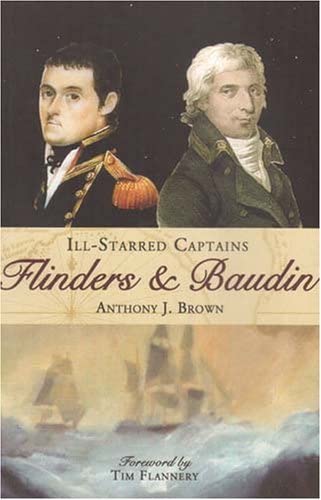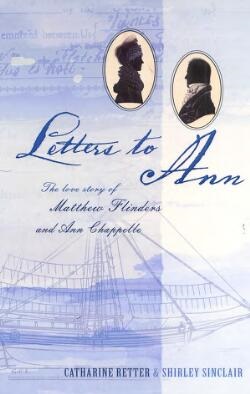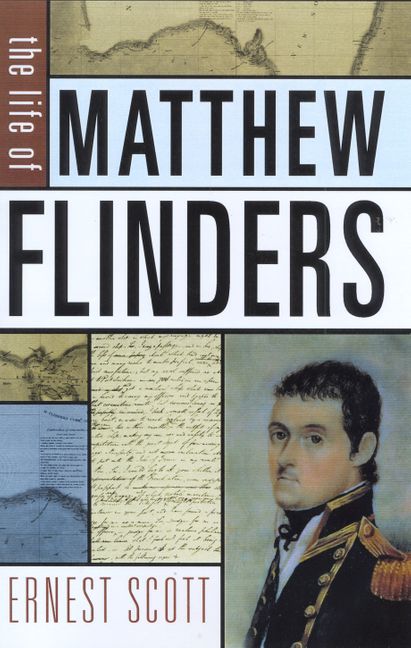- Free Article: No
- Contents Category: History
- Custom Article Title: Three books on Matthew Flinders
- Review Article: Yes
- Article Title: Wedded to His Ship
- Online Only: No
- Custom Highlight Text:
I suspect that even his contemporaries found Matthew Flinders strange and not entirely likeable. His father hoped that, like his grandfather and himself, Matthew would become a surgeon, but filled with enthusiasm for adventure after reading Robinson Crusoe, the youth insisted on a career in the navy. He wrote to the woman who would become his long-suffering wife in a style that would have been stilted even then, one that conveyed his undoubted affection in such a self-conscious way as to leave the modern reader with an unpleasant sense of self-righteousness. Amid preparations for the Investigator voyage, Flinders told his father: ‘I have no present or future intention of marrying either [Ann Chappelle] or any other person, but leave England only wedded to my ship.’ Then, when his father declined to provide him with the funds he needed to underwrite the marriage he was in fact contemplating, Flinders replied peremptorily that his father should henceforth consider that he had four children rather than five.
 Ill-Starred Captains: Flinders and Baudin by Anthony J. Brown, Crawford House, 512 pp, $49.95 hb
Ill-Starred Captains: Flinders and Baudin by Anthony J. Brown, Crawford House, 512 pp, $49.95 hb
Thinking to take his new wife out to Australia on his surveying voyage without permission, he sought to deceive both his patron Sir Joseph Banks and Admiralty officials, telling Ann: ‘It will be much better to keep this matter entirely secret. There are many reasons for it yet, and I have also a powerful one. I do not exactly know how my great friends might like it.’ This deviousness almost ended his career abruptly. When Banks told him bluntly that, if he persisted in his folly, the Admiralty would take the command of the expedition from him, Flinders decided that it was better to be wedded to his ship and left his new wife in England, disappointed, lonely and disillusioned.
Flinders also had what was, for a junior officer, a very high opinion of his own importance. When first interrogated by the French governor-general at Mauritius, where he had called without a valid passport, he disdainfully refused to remove his hat; then, when General Decaen kindly invited him to an informal dinner with his wife, Flinders stood on personal and national honour, haughtily declaring that ‘the invitation accorded so little with my previous treatment, that I thought it to be a piece of mockery, and answered that I had already dined’. When the General’s aide urged him to reconsider, he replied: ‘under my present situation and treatment, it was impossible; when they should be changed – when I should be at liberty, if His Excellency thought proper to invite me, I should be flattered by it, and accept his invitation with pleasure.’ The result was that he would remain a prisoner on the island for six bitter years. It is difficult for the modern reader not to concur with Banks’s view that Flinders might have avoided this long confinement if he had been more polite and politic.
In a moment of unwonted self-honesty, Flinders told his wife that ‘my brother will tell you that I am proud, un-indulgent, and hasty to take offence … there is more truth in the charge than I wish there was’. Between the lines of affection and concern for her plight, made worse by shortage of money and ill-health, Letters to Ann conveys a good deal of this side of his character. However, since this work is comprised mostly of Matthew’s correspondence – with interlinking text by the editors – there remains much about her that is unknown. I am not sure that Ernestine Hill’s My Love Must Wait (1941) doesn’t remain a more evocative telling of their story.
 Letters to Ann: The love story of Matthew Flinders and Ann Chappelle by Catherine Retter and Shirley Sinclair (eds), A&R, 150 pp, $21.95 pb
Letters to Ann: The love story of Matthew Flinders and Ann Chappelle by Catherine Retter and Shirley Sinclair (eds), A&R, 150 pp, $21.95 pb
Insensitivity, arrogance and deviousness were by no means the whole of Matthew Flinders’s character, though. He was one of the new breed of naval officers which emerged in the second half of the eighteenth century, men who defined success at sea – and therefore their very selves – not only by victory in battle, and the weight of prize carried home, but also by devotion to scientific discovery and the exact practice of those skills this required. These were men who explored for the sake of exploration itself; who learnt the precise practice of mathematical navigation and coastal survey; who endured years at sea in uncomfortable vessels; who facilitated the work of the scientists travelling with them, collecting myriad specimens of animals, birds, fish, plants, minerals, and much data about the peoples they encountered. James Cook was the greatest of these officers; but Flinders, via the tutelage of Bligh, is certainly to be counted a distinguished member of this new school. Flinders’s participation in the second bread-fruit expedition to Tahiti, and his subsequent explorations with Bass of the coasts south from Sydney, which led to their demonstration of the insularity of Tasmania, prepared him well for his major task, the completion of the charting of Australia’s coastline.
Ernest Scott’s Matthew Flinders was first published in 1914. As Stuart Macintyre points out in his Introduction, Scott was an early disciple of modern historical method, basing his accounts on close study of primary sources. It is perhaps surprising how essentially unchanged the portrait of Flinders offered by Scott, almost ninety years ago now, has remained. This and the documentation that Scott found in French archives remain the strongest factors in favour of his work. However, there are others that now very much date it. Subsequent scholarship has rendered dubious or invalid many of Scott’s assertions and conclusions. For example, his account of the Bounty mutiny is now inadequate and naïve, as is his assertion that there was no strategic motive to Baudin’s more-or-less parallel voyage, because in 1800–02 the British government would have willingly ceded some Australian territory to the French. Moreover, Scott wrote in an orotund style which even in 1914 must have been obsolete, and which the present editor has felt compelled to explicate. But while explication may have rendered the prose easier, it has not removed incidental errors. For example, those who now travel to Kealakekua Bay, Hawaii, and gaze upon its abrupt cliffs and the black volcanic detritus that has crumbled from them to form the littoral, will be surprised to read that Cook ‘fell … on the white sands of that bay’. In the end, Scott was not nearly the ‘scientific’ historian he at first appears. It is doubtful that this republication is justified.
 The Life of Matthew Flinders by Ernest Scott, A&R, 371 pp , $35 pb
The Life of Matthew Flinders by Ernest Scott, A&R, 371 pp , $35 pb
While Anthony Brown does fill in the personal and political backgrounds, he concentrates on Baudin’s and Flinders’s time in Australian waters. His interweaving of the events of their voyages is for the most part skilful. (I do have reservations about his mingling of his own commentary in the present tense with extracts from the journals of the voyages, but this will be largely a matter of individual disposition.) Though occasionally marred by the reiteration of old and lurid images (for example, of the convict hulks and of the New South Wales colony in its early years), Brown’s scholarship is generally extensive and up to date. His is a neatly written account which tells the reader of the tedium and trials of these long and demanding surveying voyages, which resulted in the precise delineation of the Australian continent and its naming. It also tells, movingly, of the harrowing deaths of both Baudin and Flinders, who were indeed ‘ill-starred captains’.
Each of these accounts presents essentially the same view of Flinders. He appears as a person insensitive to others and dedicated to his work, with a well-developed awareness of his own merit and of his unjust treatment by authorities, English as well as French. Perhaps this was the whole. But I wonder if there were not more, which a different kind of analysis of his years on Mauritius, particularly, where he played the flute, learned French and perhaps fell in love again, might yet bring to light.


Comments powered by CComment